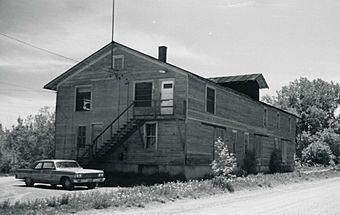Bay Port Historic Commercial Fishing District facts for kids
Quick facts for kids |
|
|
Bay Port Historic Commercial Fishing District
|
|

Office building in 1974
|
|
| Location | Saginaw Bay end of Lakeside Dr. and First St., Bay Port, Michigan |
|---|---|
| Area | 45 acres (18 ha) |
| Built | 1920 |
| NRHP reference No. | 77000714 |
| Added to NRHP | September 22, 1977 |
Imagine a place where people used to catch tons of fish every day! The Bay Port Historic Commercial Fishing District is a special area in Bay Port, Michigan. It's right next to Saginaw Bay. This district was once a very busy place for commercial fishing. That means people caught and sold fish for a living. Because of its important history, this area was added to the National Register of Historic Places in 1977.
A Look Back: History of Fishing in Bay Port
Bay Port started as a small settlement in the early 1860s. But fishing only became a big business when the railroad arrived in 1886. The railroad made it possible to ship fresh fish to many places.
Around that time, Charles Gillingham and his family moved their fishing business here. They came from North Island, which is northwest of Bay Port. In 1895, other local people started the Bay Port Fish Company nearby. Both companies grew very quickly.
They shipped fish like lake herring, walleye, and whitefish. They packed the fish in ice-filled train cars. These fish went to customers all over the eastern United States.
Bay Port: The Fishing Capital
By the 1920s and 1930s, Bay Port was famous. It was known as the biggest freshwater fishing port in the world! More than 30 fishing boats worked from this port.
The area that is now the historic district was very busy. It had docks for boats and places to clean and pack fish. There were also buildings for repairs and offices for advertising.
However, a big fire in 1945 destroyed most of the buildings. Both Gillingham's business and the Bay Port Fish Company lost their main buildings. The Bay Port Fish Company closed down after the fire.
Otto Schmidt, who was in charge of Gillingham's company, rebuilt some of the buildings. But times were tough, and business slowed down. In 1949, Schmidt started a new company to keep the remaining facilities running.
In 1965, Schmidt sold the business to Henry Engelhard and Mel Dutcher. By 1973, Engelhard owned the whole business. When Engelhard passed away in 1978, his family sold the company. The Williams family bought it and still runs the Bay Port Fish Company today!
What You Can See Today: The District's Buildings
The Bay Port Historic Commercial Fishing District is on a man-made piece of land. This land stretches about 600 feet into Saginaw Bay. It is between 100 and 500 feet wide.
When the district was first recognized in 1977, there were seven old buildings still standing. As of 2017, it looks like only three of these buildings are still there. Let's learn about them:
- Bay Port Fish Company Office Building: This building is at the start of the peninsula. It's a two-story wooden building with a sloped roof. It sits on a strong cement foundation. Built around 1920, this building holds the company offices and a storage area.
- Twine House: This building is right next to the Office Building. It's a one-and-a-half-story building. It has a cement block foundation and a special sheet-metal roof with dormer windows. This building was built in 1945.
- Fish Processing Plant: You'll find this building at the very end of the peninsula. It's also a one-and-a-half-story structure. It has a cement block foundation and a sheet-metal roof, just like the Twine House. This building was also built in 1945. It's used to unload fish from boats, clean and prepare them, and sell fish to the public.



